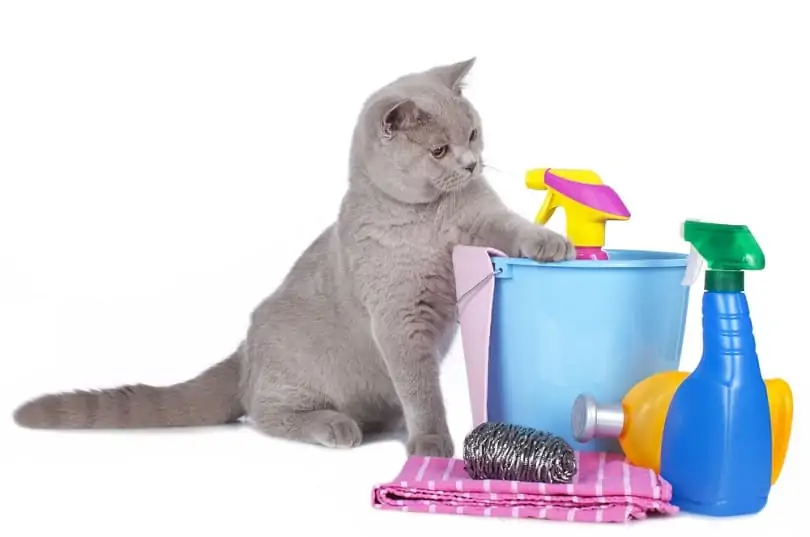“The sixth step of humility is that we are content with the lowest and most menial treatment, and regard ourselves as a poor and worthless worker in whatever task we are given, saying with the prophet: I am insignificant and ignorant, no better than a beast before you, yet I am with you always” (Ps 73:22-23). RB 7.49-50
“The seventh step of humility is that we not only admit with our tongues but are also convinced in our hearts that we are inferior to all and of less value, humbling ourselves and saying with the prophet: I am truly a worm, not even human, scorned and despised by all” (Ps 22:7). RB 7. 51-52
Feline Oblate Frosty gathers his resolve to climb the
Ladder of Humility
Hello and welcome. I’m Resident Novice William. Many thanks to you. Why? After reading the two steps of humility above I thank you for being willing to continue reading. LOL!
I understand any reluctance. I resisted when our Novice Master Br. Ricky assigned me to do a complete study of Chapter 7 – Humility in the Rule of St. Benedict.
But not only did the chapter challenge my brain. The chapter challenged my entrenched ego!
For an overview of what I learned about humility in the Rule of St. Benedict, please see my article, “A Mew for Humility.” You can reach the article by tapping here.
In this section I will unpack these two really challenging steps – Steps 6 & 7.
Novice William’s “CliffsNotes” Version of Steps 6 and 7
I know that many of you are super busy but still want to learn about the Rule. While I would encourage reading all of my unpacking, here is a quick “CliffsNotes” summary.
These two steps of humility target clearing away some big personal attachments that block the growth to humility.
Illus. Step 6
Step 6 targets clearing away our attachment to the way we think we should be treated by others for who we are and for what we do. This includes what kind of work we consider “worthy.”
Step 7 targets our attachment to how we view ourselves as compared to everyone else, feline or human, i.e., that we are better, smarter, more competent, of more value, etc., etc.
Illus. Step 7
Humility is giving up our cherished personal attachments and expectations. Then we are freed of ourselves. We are more open to God and to God’s direction. We can fulfill who we are meant to be in the service of others. Isn’t that who you would like o be?
Read on for my unpacking of these verses and steps.
Mortimer Topfur’s view of how he is to be treated.
Perhaps Mort needs to work on Step 6?
The Sixth Step of Humility
The sixth step targets our need for affirmation and adulation.
“The sixth step of humility is that we are content with the lowest and most menial treatment, and regard ourselves as a poor and worthless worker in whatever task we are given, saying with the prophet: I am insignificant and ignorant, no better than a beast before you, yet I am with you always” (Ps 73:22-23). RB 7.49-50
Wow! Tough to take in. Who wants menial treatment? Are you and I worthless workers?!
A Surprise Meaning of Step 6
When I first read this step, I found myself stuck on words like “menial,” “worthless,” and “no better than a beast.” Hiss!
Feline Benedictine scholar Br. Terrence Sebastian Furlong, OSB-F, poined me in a different direction. The essential keyword is “oontent” and not the “lowest and most menial treatment. ” Nor is it that I am a “worthless worker.” [1 ] He stresses that “the most important element of the sixth step of humility is not the lowly status of the monk [or us] but his [our] contentment.” [2]
Why contentment? When you and I are hissing and spitting about how we are treated, are we readily available to God? Our priority is ourselves and what we feel that we deserve.
Step 6 asks for acceptance. We let go of our attachment to who we think we are. We turn to what is really important – our relationship with God. Benedict quotes from Psalm 73 to remind us that God is always with us. THAT’s what’s important.
Accepting the circumstances of life as they come, Br. Augustine Fur, OSB-F, finds peace even in cleaning the cellar.
Keeping Our Trust in God and Turning from Self
Here is what Amma had to say about Step 6 in her book St, Benedict’s Toolbox:
“Step 6. To be willing to do the most menial tasks and be at peace with them.
“Humility asks us to accept the circumstances of life as they come to us. We mustn’t think we’re too good to do certain things.
The goal is to be at peace within ourselves and to trust in God’s help to see us through a difficult or unpleasant task. Benedict points us beyond the task to what’s really important – our relationship with God-so we can be content with whatever God is calling us to do.” [3]
.
Amma’s spiritual director for many years was Sr. Margaret Brackett, RSM. Sr. Peg said to Amma one day, “Every time I’ve been told where I was to go and what I was to do, especially if it seemed wrong or a bad fit for me, I remembered this.” Taking off her monastic ring, she showed Amma the inside of the band. Engraved there were the words, “It is the Lord.” Amma said this revelation Sr. Peg’s trust in God gave her chills. [4]
Purrrrrr!! We are asked not to be buffeted about by external circumstances, but to cultivate patience and trust in God through those times. We grow in our ability to accept what life brings, never letting go of God’s hand as we travel a tough road.
Sr. Peg
Benedict’s Use of Psalm 73 Reinforces the Need for Humility
It’s no accident that Benedict used Psalm 73 in Step 6 to make the point of turning from attachments to God in Step 6.
In Psalm 73 the psalmist railis about all the folks that appear to have it all – money, fame, power, prosperity, etc., etc. He is really caught up in obsessive thinking about this. I can’t lay blame because I do this, too. I chew over resentments, feline infractions, questionable behavior by humans, tasks like cleaning around the litter pan, etc., etc. I mope, too, when I don’t get thanked or recognized for what I do.
The psalmist suddenly realizes that all those negative thoughts and railings are separating him from God!
“When my soul was embittered, when I was pricked in heart, I was stupid and ignorant; I was like a brute beast toward you.” Psalm 73:21-22
When we cannot accept how we are treated or what we are asked to do, and fret about it, we forget God, the source of our strength who is with us always. Another favorite feline Sr. Scholastica Muffin, OSB-F, shares this call to focus on God.
“There will be a turning point only when we stop looking at others, stop focusing anxiously on ourselves, and quit comparing ourselves with others. The turning point is marked by looking at God, only at him. In the light of God’s mystery and greatness everything else loses importance…We will not desire anything apart from being close to God, from being on our way to Christ.” [5]
Bottom line, this step offers a corrective to our view of what we feel life owes to us so that we can follow our true priority which is seeking God.
Practicing Step 6, Novice Megan
is contended and peaceful. She knows that God is always with her.
Target in the lofty position that he deems most appropriate
The Seventh Step of Humility
The seventh step of humility addresses our attachment to the way we view ourselves as compared to everyone else.
“The seventh step of humility is that we not only admit with our tongues but are also convinced in our hearts that we are inferior to all and of less value, humbling ourselves and saying with the prophet: I am truly a worm, not even human, scorned and despised by all” (Ps 22:7). RB 7. 51-52
“Meow!!” More tough words – “inferior,” “less value,” “worm.” My feline ego is pricked! Benedictine scholar Sr. Maria Ramos’ words ring true for me here.
“The seventh degree is almost unutterable in its truth,
unbearable in its implications, unacceptable in its significance…The mind recoils.
What kind of psychology is this? We would rather hear ‘Be the best…’” [6]
Can you and I really be convinced in our hearts that we are inferior??
Would I ever mew that I am of less value than Novices Sebastian Thomas, Michael James or Terri?
I can come up with lots of reasons why I am of more value. Perhaps most often we surmise that we are of greater value and act straight from that whether we are aware of it or not.
Novice Matilda Furmier responds to Step 7; “You’ve got to be kidding! Hiss!!”
Step 7 – A Call to Appreciation and Respect
The seventh of Humility is a call to whole-hearted appreciation and respect of others. To do this we set comparisons and judgments.
Our Holy Father Benedict asks us to believe deeply within our hearts that others have more worth than we do. Why? In mulling this over I don’t think it is about self-negation. It’s about coming to a realistic view of who we are, the good and the not-so-good aspects of ourselves. We begin to do this through our appreciation of others.
Amma has told me that she does her best to practice this step. “When I work on appreciating others,” she muses, “I find that I am more open-hearted. I honor their wisdom and their gifts. This helps me to set myself aside so that I can be present to them.”
“Humility’s opposite is always preoccupation with self.” [7] I guess this is Br. Ricky’s concern for me, especially with my perpetual grooming. This step asks me to let go of my attachments to me by valuing others.
Listening with respect and with an open heart helps us along the path of humility.
Humility And Self-Awareness
Step 7 asks us to step back from our illusions of who we think we are to the truth of who we really are. We are not perfect, and we don’t need to try to be. We replace competition with community. We replace striving to be on the top of the heap to being alongside others. We replace judgment with understanding, and comparison with compassion. (See RB 72.4-5).
If we move from our attachment to being better than everyone else we can relax and be ourselves. Can we step away from trying to prove something to ourselves and others?
A Benefit of Step 7 – Listen and Learn
When we cease striving to be “top cat” or “cat in the most know” we will learn to honor, listen to, and learn from each other. I can’t learn when my mew is loud and long.
Amma wrote of the ocnnection between setting aside our prideful self-view and the ability to learn.
Bob and Jean listen attentively to appreciate and learn from Jayden
“Step 7. To recognize that I may not have the final answer and so to listen to other people.
Now this is getting tough! But the truth is, if we believe—even a little—that we’re not the be-all-and-end-all of every idea, conversation, or situation, we’ll be able to learn from others. We can recognize that we don’t always have the best answer or the best intentions in every situation and that we need others to show us the way. Humility is “the confidence that Christ can speak to me through another.” [ 9 ]
Through the listening heart of humility we can set aside our self-focus and grow into whom God wishes us to be.
The seventh step of humility is also a great leveler. As we ease up on ourselves, I believe that others will, too. People will feel more accepted.
“Unless we recognize ourselves as potentially weaker, more sinful, and more confused than others, how can we possibly understand and accept them?…The seventh step of humility asks us to accept the idea that we have plenty of room for growth.” [10]
Pride is a house of cards that is
bound to topple
Benedict’s Use of the Psalms in Step 7
Pondering verse 7.53 and 54 helped me to further understand this step. Perhaps it took an experience of failed self-reliance to turn the psalmist away from self-focus to God and humility.
“I was exalted, then I was humbled and overwhelmed with confusion” (Ps 88:16). “And again, It is a blessing that you have humbled me so that I can learn your commandments” (Ps 119:71, 73). RB 7.53-54
Failure is tough, says the Psalmist.
Yet failure can open the door to God
and keep us on the path of humility.
Closing Thoughts from Novice William
There is no doubt that these two steps of humility are challenging. My suggestion is to take small steps into practicing each.
Step 6 – Find contentment through respect and acceptance of others
Step 7 – Step back from thinking that you are the best and learn from others.
Thank you for reading my unpacking of Step 6 and Step 7 in Benedict’s chapter on humility. May God guide you along this path of self-giving to others…to yourself, too!
Have a blessed day,
Resident Novice William
Resident Novice William
Interested in learning more about humility?
I invite you to read my article “A Mew for St. Benedict’s Ladder of Humility.”
©October 2024, Novice William and Jane Tomaine
Endnotes
[1] Br. Furling quotes Benedictine monk Terrence G. Kardong, Benedict’s Rule: A Translation and Commentary (Collegeville, MN: Liturgical Press, 1996), 116. FYI, see Jesus’ parable of the Worhtless Worker, Luke 17:7-10.. Jesus’ point is that by doing God’s will we are doing our duty – no reward necessary.
[2] Jane Tomaine, St. Benedict’s Toolbox: The Nuts and Bolts of Everyday Benedictine Living Harrisburg. PA: Morehouse Publishing, 2015), 57.
[3] Jane Tomaine, The Rule of Benedict: Christian Monastic Wisdom for Daily Living (Nashville, TN: Skylight Paths Publishing, 2017), 75.
[4] Sr. Scholastic draws from Dennis Okholm, Monk Habits for Everyday People: Benedictine Spirituality for Protestants (Grand Rapids, MI: Brazos Press, 2007), 56.
[5] Kardong, 111.
[6] Okholm, 65.
[7] Jeremy Kodell, O.S.B., “Mutual Obedience: My Brother’s Need is the Voice of God,” The American Benedictine Review, 64:4 (December 2013), 410.
[8] Dom Leonard Vickers, “On a Human Note,” in A Touch of God: Eight Monastic Journeys, ed. Maria Boulding (Still River, MA: St. Bede’s Publications, 1982), 134-135.



















